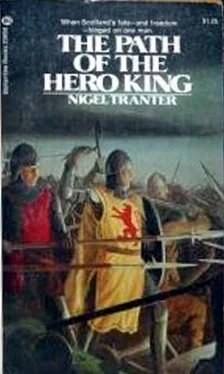It was a young giant who sang, clad in saffron tunic, piebald calfskin jerkin and gem-studded harness, with strongly mobile features and shoulder-length tawny hair which, like the great ox-horned helmet he had laid by, spoke of the Norse influence which for centuries had permeated the Gaelic Hebrides. Only in the Celtic civilisation, with its emphasis on the arts of living, in music and song and poetry, design and beauty would a young man who sang thus, before all, not be considered effeminate; this singer need fear no such imputation, at any rate, for he was a renowned warrior, Seumas son of Donald, son of Ranald, of Oronsay, one of Angus Ogs chieftains.
As the rich, vibrant tenor commenced yet another verse of the ballad the tenth, or perhaps the twelfth-the King, aspr awl on a springy couch of pine-twigs and bracken, gazed round at the scene with some measure of real satisfaction. For here, surely, was something that he had achieved, and only he. Never before, since the realm of Scotland became a unity, had a King of Scots been able to do what he was doing. Here was a wholly Highland host, only the Earl of Lennox-who was a sort of tamed Highlander himself-sitting at his right, and Gibbie Hay, with his charge Thomas Randolph, were Southrons, the former frankly asleep, the latter looking stiffly bored. All the rest, chiefs and chieftains, from Angus of the Isles and Neil Campbell of Lochawe, down to the running gillies and horse-boys, were clansmen, Highlanders to a man-Islesmen of the MacDonald and MacRuarie confederation;
Campbells from South Argyll; MacGregors whom they had collected at Glen Strae and Glen Orchy, under their intimidating chief Malcolm himself;
Macleans of Morvern; and most interest-of all, Macphersons,
Cattanachs, Shaws and Mackintoshes from Badenoch, Comyn lands which
they had passed through on their move north from Lorn-but which,
unlike the true Lowland Comyn country of Buchan, had only been gained
in conquest by its Norman lords, not married into, so that its Highland
population showed no enmity to Bruce, and following the example of the
West Highland chiefs contributed their quota to the royal advancing army. Hitherto no King of Scots would, or could, have entrusted himself to a Highland army, since the Lowlanders looked upon these people as barbarians, little better than vermin, not to be associated with nor trusted. Yet here he lay, secure and accepted, within a company of 4,000 and more of these Highlanders, on the southern shore of Loch Ness, hundreds of miles deep within their mountain fastnesses. Moreover, using them to counter another Highland army, just across the water.
The King turned his glance, as he had done frequently that early August night, away from the dramatic scene of blazing fires and flaring pitch-pine torches and the thronged colourful ranks of fierce-looking clansmen, lit by the glow of the flames, against the twisted silhouettes of the trees and the black outlines of the crouching mountains-turned to the north. Loch Ness, although all of twenty-three miles long, was little more than a mile wide here, between Dores and Inverfarigaig: and across that mile more fires gleamed red against black hills.
For what seemed leagues those points of light glowed and flickered, left and right, marking the north shore of the loch, though they were less bright to the right, the north, where Urquhart Bay curved deeply back at the mouth of Glen Urquhart. The sky was overcast and dark for an August night, so that the host of fires showed the brighter, where the Earl of Rosss army awaited them, had awaited them for days; indeed, from all accounts, for weeks, on the borders of his great territory. For all Scotland to the north of where they camped here was in the grip of William of Ross, since it consisted of but the two mighty earldoms, and Sutherland happened to be he ired by a minor, whom Ross dominated.
Caithness was a no-mans-land, disputed between the crowns of Scotland and Norway, but in fact its unruly clans were also under the thumb of Ross. How many men lay encamped across Loch Ness none knew for certain-though there were tales of tens of thousands.
That was undoubtedly an exaggeration-but there was enough to give Bruce pause, at any rate.
His glance, as had happened before, tended to dwell upon a certain point over there, some way east of directly across the dark waters. Here the pattern of lights was different, the gleams smaller and feebler and clustered close together, some indeed one above another. And it was noticeable that none of the larger lights looked close to these, on either side. For these indeed were not fires at all, but lights from windows, candle lamp or torch-the lights of Urquhart Bay. That was Crown property, a royal castle, strong and strategically placed at the mouth of Glen Urquhart, guarding the only road to lead into the northeast between Inverness and the Western Sea. And presently held by Sir Alexander Comyn, brother of the Earl of Buchan.
The King rubbed his chin, eyes narrowed.
The singing was succeeded by Highland dancing, seemingly wild but essentially disciplined nevertheless, with the wailing, shrilling, groaning music of the bagpipes bubbling and skirling to hills and sky, when Bruce suddenly came to a decision and rose to his feet.
Angus Og, from near by, looked up.
You join the dancing, Sir King? he asked, brows raised.
Not tonight. I think that I will make a call. Across the loch.
The night being dark.
Now? By night? You mean-in force?
No. A secret call. Private, very. Come you with me, my lord?
The other hesitated.
If so you wish. And believe it worth the doing.
I believe it worth the trial, at least, yes. There are more weapons than swords in a Kings armoury, friend.
Though all there who could hear looked uncertain, many wished to accompany the monarch nevertheless. But Bruce declared that two small boats were all that should go, the second only as a precaution in case of trouble. For days the Highlanders had been collecting boats from all up and down the loch side for many miles, assembling them hereabouts; also felling trees for rafts, for the boats to tow over. The shoreline was a mass of craft therefore, for 4,000 men would take a deal of ferrying across that mile of water, should it ever come to that.
Ordering the dancing to continue, the King led a little group out of
the circle of the firelight and down to the shingly beach. Angus Og,
Hay and Randolph-who was religiously taken everywhere that Hay went
joined Bruce, with two gillies for the oars, in one boat; Lennox,
Campbell and the young man whom Bruce had knighted with Somerleds
sword at Castle Tioram, Sir Ranald MacRuarie of Smearisary, went in the
second boat. Christina MacRuarie had returned to Moidart, meantime,
during the recent Lorn campaign, but had sent her nephew, Sir Ranald,
with 400 men, as her link with the King. A popular young man with the
Highlanders, because of his storytelling abilities, he now rejoiced in
the somewhat empty title of royal cup-bearer. At the last moment a
long lean dark figure came scuttling down to the strand, and came
clambering aboard the Kings craft, all flapping black robes, much to
the scorn of Angus of the Isles-Master Bernard de Linton, the secretary. Shrugging, Bruce let him stay.
The oarsmen were set to row half-right, north by east, and at their quietest.
Presently, above the creak of row locks and splash of blades, Bruce heard sounds at their backs, and stared astern.
There are craft behind us, he jerked.
Following.
More than one, the Lord of the Isles agreed grimly.
Think you I would allow the whole leadership of this host to risk capture over there? Without a sufficiency of broadswords at our backs to ensure our safety.
Читать дальше












